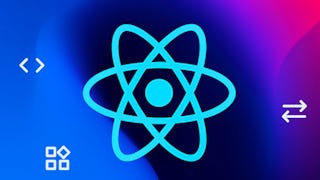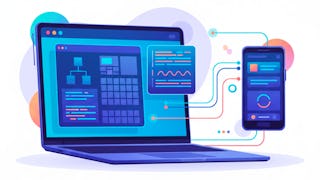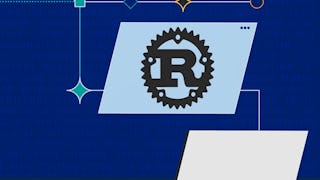- Browse
- Reactive Programming
Reactive Programming Courses
Reactive programming courses can help you learn asynchronous data streams, event-driven architecture, and the principles of reactive systems. You can build skills in handling real-time data, managing state changes, and implementing backpressure strategies. Many courses introduce tools like RxJava, Reactor, and Akka, that support building responsive applications and integrating with APIs. By exploring these topics, you’ll gain practical experience in creating applications that efficiently respond to user interactions and system events.
Popular Reactive Programming Courses and Certifications
 Status: Free TrialFree TrialR
Status: Free TrialFree TrialRRice University
Skills you'll gain: Apache Kafka, Apache Spark, Apache Hadoop, Distributed Computing, Dataflow, Java Programming, Java, Software Architecture, Systems Architecture, Scala Programming, Data Structures, System Programming, Programming Principles, Servers, Application Frameworks, Debugging, Algorithms, Performance Tuning, Functional Design, Performance Testing
4.6·Rating, 4.6 out of 5 stars1.6K reviewsIntermediate · Specialization · 3 - 6 Months
 Status: Free TrialFree TrialU
Status: Free TrialFree TrialUUniversity of California, Irvine
Skills you'll gain: Go (Programming Language), Back-End Web Development, Object Oriented Programming (OOP), System Programming, Debugging, Algorithms, Functional Design, Computer Programming Tools, Data Access, Data Structures, Software Design, Operating Systems, Computer Architecture
4.6·Rating, 4.6 out of 5 stars3K reviewsIntermediate · Specialization · 3 - 6 Months
 Status: NewNewStatus: Free TrialFree TrialV
Status: NewNewStatus: Free TrialFree TrialVVanderbilt University
Skills you'll gain: Generative AI Agents, Debugging, TypeScript, Agentic systems, AI Workflows, Node.JS, OpenAI API, Generative AI, Program Development, Artificial Intelligence, LLM Application, Programming Principles, Maintainability, Development Environment, Prompt Engineering, Application Frameworks, Javascript, Large Language Modeling, File Systems
Beginner · Course · 1 - 4 Weeks
 Status: Free TrialFree Trial
Status: Free TrialFree TrialSkills you'll gain: Node.JS, React Redux, Restful API, Database Design, Ajax, Database Application, Databases, Full-Stack Web Development, Server Side, NoSQL, Back-End Web Development, Front-End Web Development, Javascript, React.js, Performance Tuning, API Design, Data Structures, MongoDB, Debugging, JavaScript Frameworks
4.4·Rating, 4.4 out of 5 stars1.4K reviewsBeginner · Specialization · 3 - 6 Months
 Status: NewNewStatus: Free TrialFree Trial
Status: NewNewStatus: Free TrialFree TrialSkills you'll gain: React Redux, React Native, React.js, Application Development, Scalability, Data Validation, UI Components, Web Applications, Mobile Development, Data Persistence, Business Logic, Application Design, Front-End Web Development, Software Design, Authentications, User Interface (UI), User Experience Design, User Interface and User Experience (UI/UX) Design, User Interface (UI) Design, Node.JS
Beginner · Specialization · 3 - 6 Months
 Status: Free TrialFree TrialD
Status: Free TrialFree TrialDDuke University
Skills you'll gain: Rust (Programming Language), Containerization, Data Pipelines, CI/CD, Docker (Software), Jenkins, Application Deployment, DevOps, LLM Application, Hugging Face, Large Language Modeling, Test Case, Restful API, Serverless Computing, Generative AI, Amazon Web Services, Command-Line Interface, Natural Language Processing, Computer Programming, Cloud Computing
3.9·Rating, 3.9 out of 5 stars279 reviewsBeginner · Specialization · 3 - 6 Months
What brings you to Coursera today?
 Status: Free TrialFree Trial
Status: Free TrialFree TrialSkills you'll gain: Jest (JavaScript Testing Framework), Web Development Tools, Javascript, Unit Testing, Web Applications, Programming Principles, Object Oriented Programming (OOP), Event-Driven Programming, Node.JS, JSON, Computer Programming, Data Structures, Debugging, Package and Software Management, Program Development, Front-End Web Development, Development Environment, Functional Design
4.7·Rating, 4.7 out of 5 stars4.9K reviewsBeginner · Course · 1 - 3 Months
 Status: Free TrialFree TrialE
Status: Free TrialFree TrialEEdureka
Skills you'll gain: Angular, Application Deployment, JavaScript Frameworks, Software Testing, Test Tools, Web Development Tools, Unit Testing, Application Performance Management, CI/CD, Continuous Integration, Web Applications, TypeScript, Ajax, Application Lifecycle Management, Secure Coding, Web Development, Code Coverage, Software Architecture, Command-Line Interface, Version Control
4.2·Rating, 4.2 out of 5 stars16 reviewsIntermediate · Specialization · 1 - 3 Months
 Status: Free TrialFree TrialM
Status: Free TrialFree TrialMMeta
Skills you'll gain: Mobile Development, React.js, Web Applications, Event-Driven Programming, Application Development, UI Components, Front-End Web Development, Cascading Style Sheets (CSS), Javascript, Hypertext Markup Language (HTML), Data Management
4.7·Rating, 4.7 out of 5 stars2.6K reviewsBeginner · Course · 1 - 4 Weeks
 Status: Free TrialFree TrialJ
Status: Free TrialFree TrialJJohns Hopkins University
Skills you'll gain: Artificial Neural Networks, Image Analysis, Event-Driven Programming, Scalability, Deep Learning, C and C++, Performance Tuning, Convolutional Neural Networks, Data-oriented programming, C++ (Programming Language), Digital Signal Processing, Linear Algebra, Distributed Computing, Computer Graphics, System Programming, Mathematical Software, Numerical Analysis, Programming Principles, Computer Architecture, Machine Learning
Build toward a degree
2.8·Rating, 2.8 out of 5 stars188 reviewsIntermediate · Specialization · 3 - 6 Months
 Status: Free TrialFree Trial
Status: Free TrialFree TrialSkills you'll gain: React Native, Mobile Development, React Redux, Ajax, User Interface and User Experience (UI/UX) Design, Front-End Web Development, Javascript, React.js, Data Structures, Application Development, Apple iOS, Debugging, iOS Development, JavaScript Frameworks, User Story, Android Development, UI Components, Cross Platform Development, JSON, Flutter (Software)
4.4·Rating, 4.4 out of 5 stars940 reviewsBeginner · Specialization · 3 - 6 Months
 Status: NewNewStatus: Free TrialFree Trial
Status: NewNewStatus: Free TrialFree TrialSkills you'll gain: Swift Programming, Apple iOS, Application Development, Mobile Development, Software Architecture, Application Design, Secure Coding, Software Design Patterns, UI Components, Data Validation, User Interface (UI)
Intermediate · Course · 1 - 4 Weeks
In summary, here are 10 of our most popular reactive programming courses
- Parallel, Concurrent, and Distributed Programming in Java: Rice University
- Programming with Google Go: University of California, Irvine
- AI Agents in Typescript/Javascript with Generative AI: Vanderbilt University
- JavaScript Programming with React, Node & MongoDB: IBM
- Apply React & React Native Through Real-World Projects: EDUCBA
- Rust Programming: Duke University
- Programming with JavaScript: Meta
- Mastering Angular Development: Edureka
- React Basics: Meta
- GPU Programming: Johns Hopkins University
Frequently Asked Questions about Reactive Programming
Reactive programming is a programming paradigm focused on asynchronous data streams and the propagation of change. It allows developers to create systems that are more responsive and resilient, particularly in environments where data is constantly changing. This approach is important because it helps manage complex event-driven systems, making applications more efficient and easier to maintain. By embracing reactive programming, developers can build applications that respond to user inputs and system events in real-time, enhancing user experience and system performance.
With skills in reactive programming, you can pursue various roles in the tech industry. Common job titles include Software Developer, Front-End Developer, Back-End Developer, and Full-Stack Developer. Additionally, positions such as Data Engineer and Systems Architect may also require knowledge of reactive programming principles. As organizations increasingly adopt reactive systems for their applications, the demand for professionals skilled in this area continues to grow, providing numerous opportunities for career advancement.
To learn reactive programming effectively, you should focus on several key skills. First, a solid understanding of programming languages such as Java, Scala, or JavaScript is essential. Familiarity with frameworks like RxJava or Akka can also be beneficial. Additionally, grasping concepts related to asynchronous programming, event-driven architecture, and functional programming will enhance your ability to work with reactive systems. Finally, knowledge of software design patterns and best practices will help you implement reactive programming effectively in real-world applications.
There are several excellent online courses available for learning reactive programming. For instance, Programming Reactive Systems offers a comprehensive introduction to the principles and practices of reactive programming using Scala and Akka. Another option is Advanced Data Handling and Reactive Programming Concepts, which dives deeper into advanced topics. These courses provide valuable insights and hands-on experience, making them suitable for learners at various levels.
Yes. You can start learning reactive programming on Coursera for free in two ways:
- Preview the first module of many reactive programming courses at no cost. This includes video lessons, readings, graded assignments, and Coursera Coach (where available).
- Start a 7-day free trial for Specializations or Coursera Plus. This gives you full access to all course content across eligible programs within the timeframe of your trial.
If you want to keep learning, earn a certificate in reactive programming, or unlock full course access after the preview or trial, you can upgrade or apply for financial aid.
To learn reactive programming, start by selecting a course that aligns with your current skill level and interests. Begin with foundational concepts, such as understanding asynchronous programming and data streams. Practice coding exercises to reinforce your learning. Engage with community forums or study groups to discuss challenges and share insights. As you progress, work on small projects to apply your knowledge in real-world scenarios. This hands-on experience will deepen your understanding and build your confidence in reactive programming.
Typical topics covered in reactive programming courses include the fundamentals of reactive programming, asynchronous data streams, event handling, and the use of reactive libraries and frameworks. You may also explore concepts like backpressure, observables, and functional programming principles. Advanced courses might explore into specific frameworks, such as Akka or RxJava, and cover best practices for implementing reactive systems in production environments.
For training and upskilling employees in reactive programming, courses like Programming Reactive Systems are highly recommended. These courses provide a structured approach to learning the principles of reactive programming, making them suitable for teams looking to enhance their skills. Additionally, organizations can benefit from tailored training programs that focus on specific frameworks or applications relevant to their business needs.










